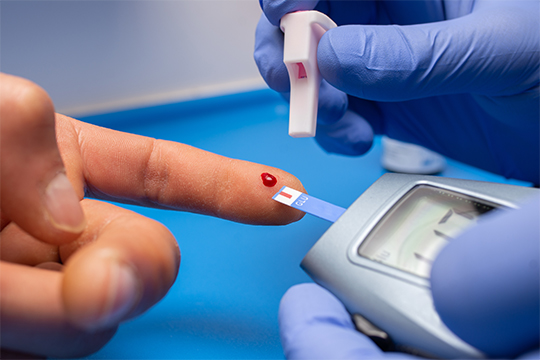Home > Disease and Treatments > Understanding Thyroid: Impact on Daily life
Understanding Thyroid: Impact on Daily life
The thyroid a small butterfly-shaped gland located in the neck, plays a remarkable role in maintaining our overall health and well-being. While it may be small in size, its significance cannot be overstated. The thyroid gland is responsible for producing hormones that regulate various bodily functions, and any disruption in its function can significantly impact a person's daily life.
What is Thyroid?
The thyroid gland, situated just below the larynx (commonly known as the voice box), produces two primary hormones: thyroxine (T4) and triiodothyronine (T3). These hormones play a vital role in controlling the body's metabolism, which encompasses processes like energy production, temperature regulation, and the functioning of organs and tissues.
Thyroid Disorders
Hypothyroidism
When the thyroid gland does not produce enough hormones, it results in a condition called hypothyroidism. This can lead to a range of symptoms, including fatigue, weight gain, depression, and cold intolerance. People with hypothyroidism often feel sluggish and may struggle to carry out daily tasks due to low energy levels.
Hypothyroidism
In contrast, hyperthyroidism occurs when the thyroid gland produces an excess of hormones. This can lead to symptoms such as rapid heart rate, anxiety, weight loss, and excessive sweating. People with hyperthyroidism may find it challenging to concentrate and experience heightened stress.
Impact on Daily Life
Thyroid hormones have a profound impact on various aspects of our well-being. They play a pivotal role in regulating energy production in the body, influencing our overall vitality. When dealing with hypothyroidism, individuals often grapple with chronic fatigue, which can make it challenging to stay active and alert throughout the day. Conversely, those with hyperthyroidism may experience restlessness, finding it difficult to relax.
These thyroid hormones also significantly affect mood and mental health. Hypothyroidism is often associated with symptoms of depression and brain fog, which can hinder one's ability to concentrate and maintain a positive outlook. On the other hand, hyperthyroidism can lead to increased anxiety and irritability, impacting emotional well-being.
Moreover, thyroid disorders can disrupt weight management. Hypothyroidism tends to lead to weight gain despite efforts to control it, while hyperthyroidism can result in unintended weight loss. These fluctuations in body weight can be frustrating and challenging to manage.
Thyroid hormones are essential for regulating body temperature. Individuals with thyroid disorders may struggle to tolerate extreme temperatures, feeling excessively cold or hot, further affecting their comfort and daily life. Additionally, thyroid hormones influence heart rate and blood pressure, and an imbalance in these hormones can lead to heart palpitations and increased cardiovascular risks. Overall, the thyroid's influence on our body is extensive, impacting everything from energy levels to emotional well-being and physical health.
Diagnosis
Physical Examination
The first step in diagnosing a thyroid disorder often involves a physical examination by a healthcare provider. They may check for physical signs such as enlargement of the thyroid gland (goiter), changes in the skin or hair, and other symptoms.
Blood Tests
Blood tests are crucial for assessing thyroid function. The most common blood tests include:
- Thyroid Stimulating Hormone (TSH): Elevated TSH levels may indicate an underactive thyroid (hypothyroidism), while low levels can suggest an overactive thyroid (hyperthyroidism).
- Free Thyroxine (FT4): This measures the level of the thyroid hormone thyroxine (T4) circulating in the bloodstream.
- Free Triiodothyronine (FT3): This assesses the level of the thyroid hormone triiodothyronine (T3) in the blood.
- Thyroid Antibody Tests: These tests can help diagnose autoimmune thyroid disorders such as Hashimoto’s thyroiditis and Graves’ disease.
Treatment
Medication
Thyroid disorders are often managed with medication:
Hypothyroidism: This is typically treated with synthetic thyroid hormone replacement therapy, such as levothyroxine (Synthroid). Patients need to take this medication daily to maintain normal thyroid hormone levels.
Hyperthyroidism: Treatment options may include antithyroid drugs (like methimazole or propylthiouracil), radioactive iodine therapy, or, in some cases, surgery to remove part or all of the thyroid gland.
Surgery: Thyroid surgery (thyroidectomy) may be recommended for various reasons, including the removal of thyroid nodules, goiter, or treatment of thyroid cancer. Depending on the extent of surgery, patients may need lifelong thyroid hormone replacement therapy.
Lifestyle Modifications
In addition to medical treatment, certain lifestyle changes can help manage thyroid disorders. These may include dietary modifications, stress reduction, and regular exercise.
Patients with thyroid disorders require ongoing monitoring and follow-up appointments with their healthcare providers. Regular blood tests and check-ups are essential to ensure that thyroid hormone levels remain within the target range.It's crucial to note that the specific diagnosis and treatment plan will depend on the type and severity of the thyroid disorder. Patients should work closely with their healthcare providers to determine the most appropriate approach to managing their condition.
The thyroid gland is a small but mighty regulator of our daily lives. When it functions correctly, it ensures our body operates efficiently. However, thyroid disorders can disrupt these vital functions, affecting energy levels, mood, weight, and overall well-being. If you suspect you may have a thyroid disorder, it is essential to consult a healthcare professional for proper diagnosis and treatment. With proper medical care, individuals with thyroid disorders can effectively manage their condition and improve their daily lives.





